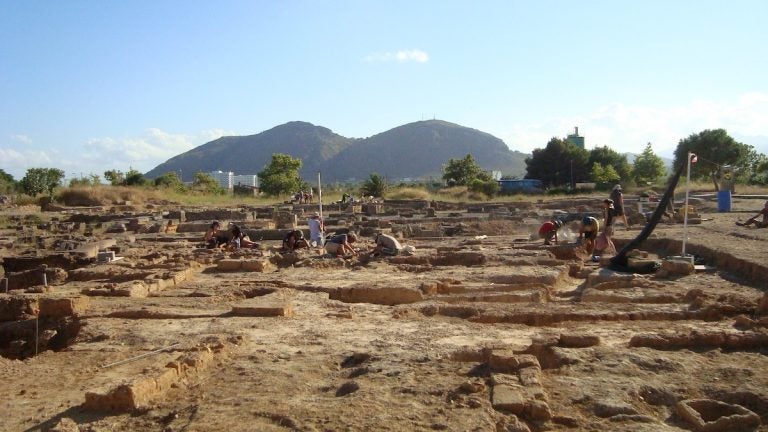GFS student helps unearth ancient Roman artifacts in Spain

The excavation site in Mallorca. (Photo courtesy of Addie McKenzie)
Addie McKenzie has always been passionate about history. When she was younger, her family took vacations in Rome and Spain, where the ruins and art piqued her curiosity about the ancient world.
As a sophomore at Germantown Friends School last year, a Latin-history class inspired her to seek out a summer program where she could explore her interest in history and archaeology.
Now, she has returned from a trip to Spain where she got hands-on experience excavating ancient ruins.
The big dig
Earlier this summer, McKenzie, 16, helped a team of professional archaeologists and other high-school students unearth the remains of Roman artifacts and buildings on the Spanish island of Majorca in the Mediterranean.
The dig crew, led by ArchaeoSpain, an educational and archaeological organization based in Connecticut and Madrid, uncovered human remains, several coins, sections of taverns and what might be the oldest building in the ancient Roman city of Pollentia.
McKenzie and the other young archaeologists at the Pollentia field school — which included students from Spain, the United States, Great Britain and Oman — spent four weeks in Majorca this summer learning methods of excavation, surveying and cataloguing artifacts.
Educational explorations
Students also attended lectures on Spanish history and archaeology, learned how to sketch artifacts and took weekend trips to nearby historical sites. (ArchaeoSpain is one of the few such programs in the world geared toward high-school students.)
“Addie and her co-workers have learned not only how to conduct an excavation and how to interpret the archaeological clues discovered,” said ArchaeoSpain director Mike Elkin, “but they have experienced Spain away from the tourist traps and bonded with a local community.”
The program hasn’t been only a learning experience.
According to Elkin, students have been an integral part of real archaeological discoveries: “Over the past few years, our joint Spanish-international teams have uncovered priceless information about Spain’s ancient past.”
McKenzie said she and her fellow students were thrown into the middle of a professional excavation and had to follow along with complex instructions, often in Spanish.
“We found our way pretty quickly, and that just made it all the more rewarding,” McKenzie told NewsWorks. “Every day we had exciting findings, such as Roman coins and countless shards of pottery. Just being in Majorca while digging up an ancient city was a surreal experience in itself.”
WHYY is your source for fact-based, in-depth journalism and information. As a nonprofit organization, we rely on financial support from readers like you. Please give today.





